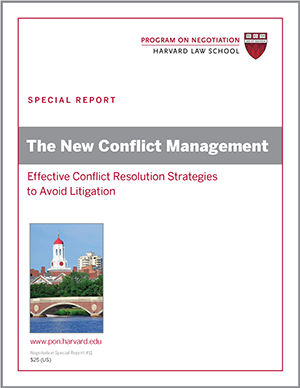Though Congress and the President were able to reach a deal and avoid the dreaded fiscal cliff, both sides engaged in some tough negotiating which has both bewildered and captivated the United States for months. Given all of the posturing and tough talk, some may ask: Is there a method to this madness?
Program on Negotiation Chair Robert Mnookin recently sat down with Claire Suddath of Bloomberg News to discuss the Congress’ and President’s negotiation styles and why it is sometimes acceptable to engage in less-than-orthodox negotiating tactics.
When asked about the last minute nature of the deal and the potential tactics being employed in dragging out the negotiations, Mnookin commented: “I was not surprised that nothing happened until the absolute deadline. Given the internal conflicts within each party, especially within the Republicans, it was important for each side to hold out rather firmly until the very last moment to see if they could extract more concessions from the other side.“
In addition to negotiations playing out in a very public space, both the Democrats and Republicans are grappling with very tough behind the table issues that complicate the negotiating process.
How has this tough process set up future negotiations between the two parties?
According to Professor Mnookin, “A very high fraction of the Republicans were elected to the House in what are called safe seats: districts that went squarely for Romney and that will probably lean Republican in the next election, too. They’re not worried about looking bad next to Democrats; they’re worried about being outflanked on the right by another Republican in the next primary.”
Additionally, while Democrats held the advantage in these negotiations over Republicans, in the next round Republicans may have a slight edge because, “[t]he House Republicans have a lot of leverage because if entitlements aren’t cut to their liking they can block an increase in the debt ceiling. And then the government runs out of money. The Obama administration will almost certainly take a lot of blame for that. This is going to be a bitter, hard-nosed bargain.
When asked about the potential bitter feelings between negotiating parties, Mnookin remarked that, “You don’t have to be buddies with the people you negotiate with, although relationships do matter. And when you insult someone, you never know how they’re going to take that. Some people will be insulted for life by that and others will brush it off.”
Related Conflict Resolution Article: Negotiating with Your Children – How to Resolve Family Conflicts
Originally published in 2012.





You ought to be a part of a contest for one of the most useful blogs online.
I’m going to highly recommend this site!